| کد مقاله | کد نشریه | سال انتشار | مقاله انگلیسی | نسخه تمام متن |
|---|---|---|---|---|
| 5515631 | 1541912 | 2016 | 10 صفحه PDF | دانلود رایگان |

- Study indicated higher tolerance of black poplar to boron toxicity and accumulation.
- Black poplar quite suitable for phytoremediation of boron polluted areas.
- Transcriptome of black poplar indicated many distinct genes and pathways responsible in boron toxicity tolerance.
- Boron toxicity tolerance of black poplar associated to the genes functional in boron uptake, transport and detoxification.
Boron (B) is an essential nutrient for normal growth of plants. Despite its low abundance in soils, it could be highly toxic to plants in especially arid and semi-arid environments. Poplars are known to be tolerant species to B toxicity and accumulation. However, physiological and gene regulation responses of these trees to B toxicity have not been investigated yet. Here, B accumulation and tolerance level of black poplar clones were firstly tested in the current study. Rooted cutting of these clones were treated with elevated B toxicity to select the most B accumulator and tolerant genotype. Then we carried out a microarray based transcriptome experiment on the leaves and roots of this genotype to find out transcriptional networks, genes and molecular mechanisms behind B toxicity tolerance. The results of the study indicated that black poplar is quite suitable for phytoremediation of B pollution. It could resist 15 ppm soil B content and >1500 ppm B accumulation in leaves, which are highly toxic concentrations for almost all agricultural plants. Transcriptomics results of study revealed totally 1625 and 1419 altered probe sets under 15 ppm B toxicity in leaf and root tissues, respectively. The highest induction were recorded for the probes sets annotated to tyrosine aminotransferase, ATP binding cassette transporters, glutathione S transferases and metallochaperone proteins. Strong up regulation of these genes attributed to internal excretion of B into the cell vacuole and existence of B detoxification processes in black poplar. Many other candidate genes functional in signalling, gene regulation, antioxidation, B uptake and transport processes were also identified in this hyper B accumulator plant for the first time with the current study.
Journal: Plant Physiology and Biochemistry - Volume 109, December 2016, Pages 146-155